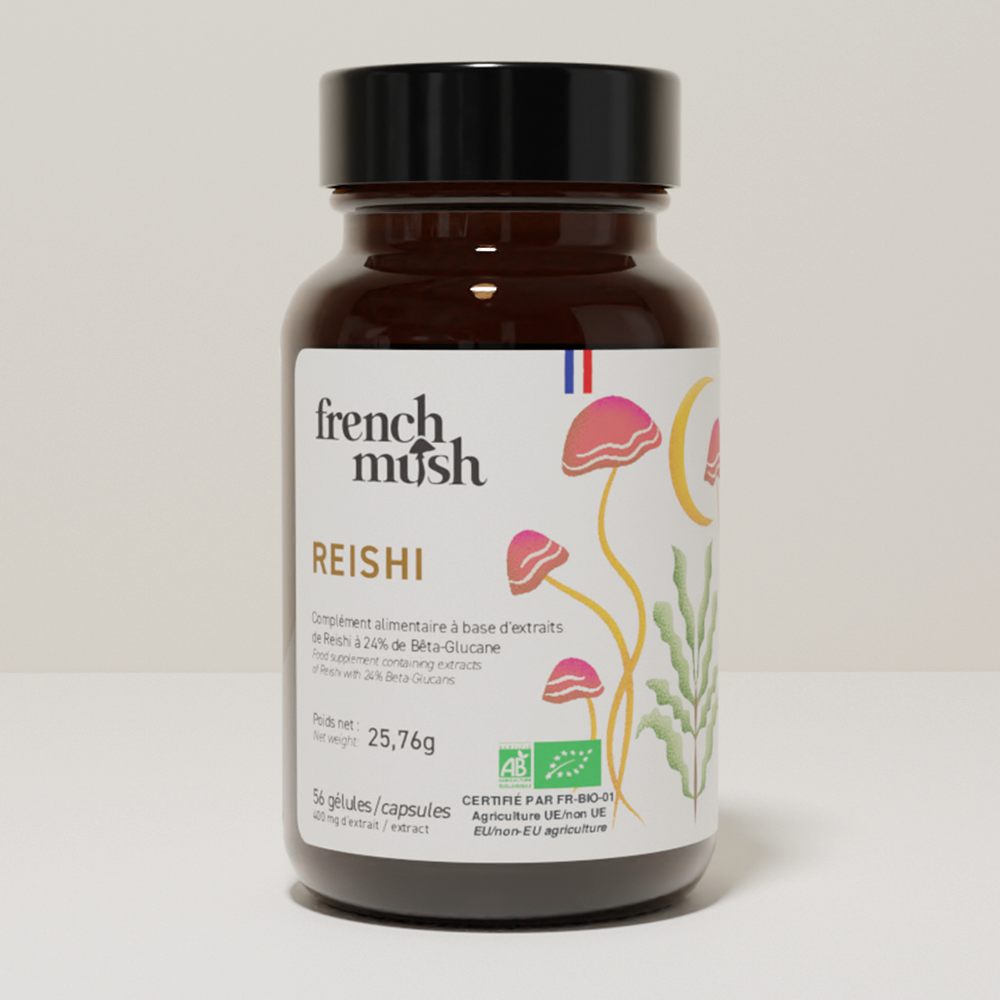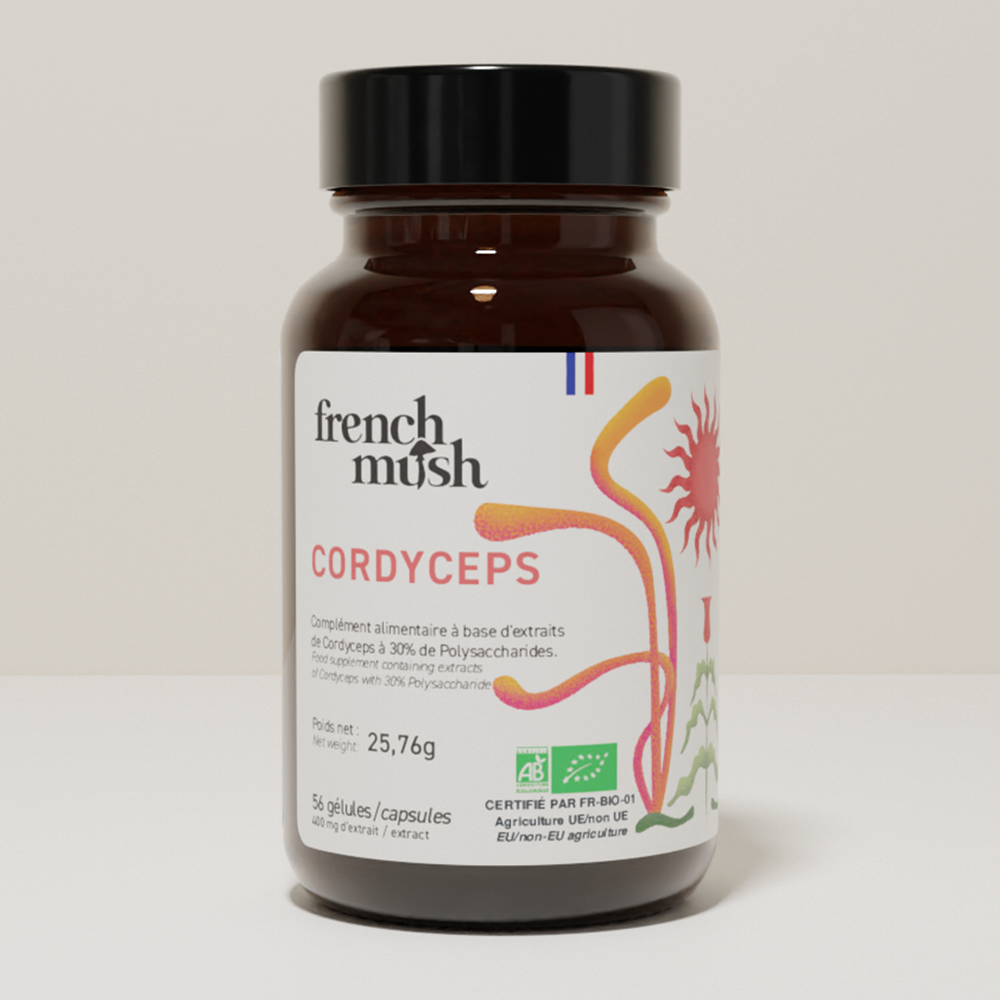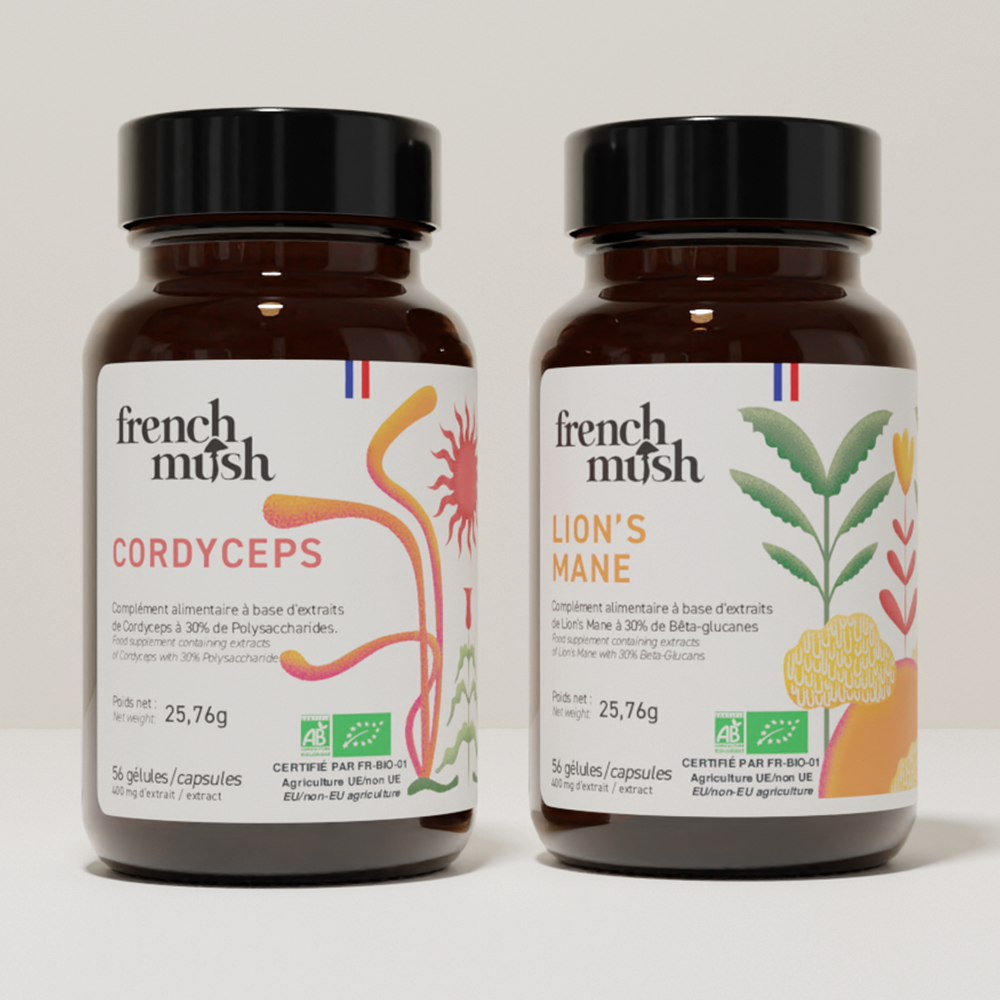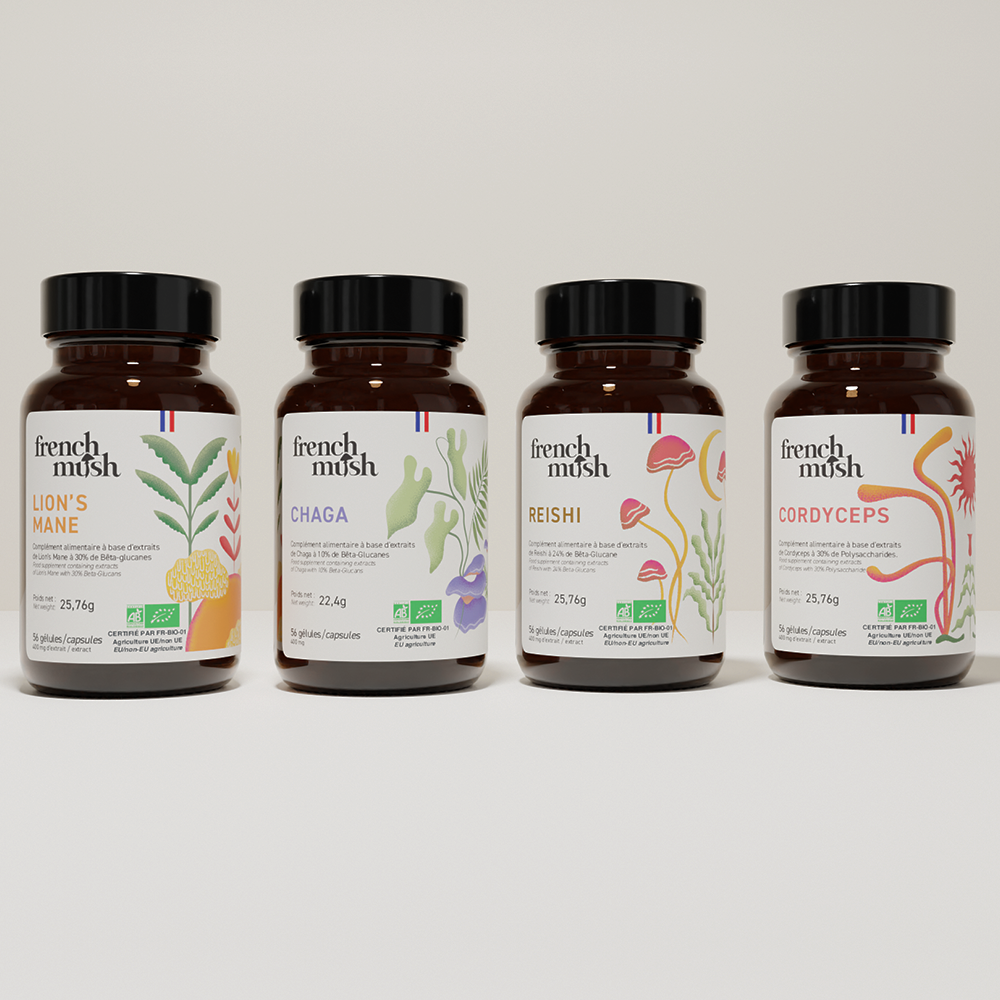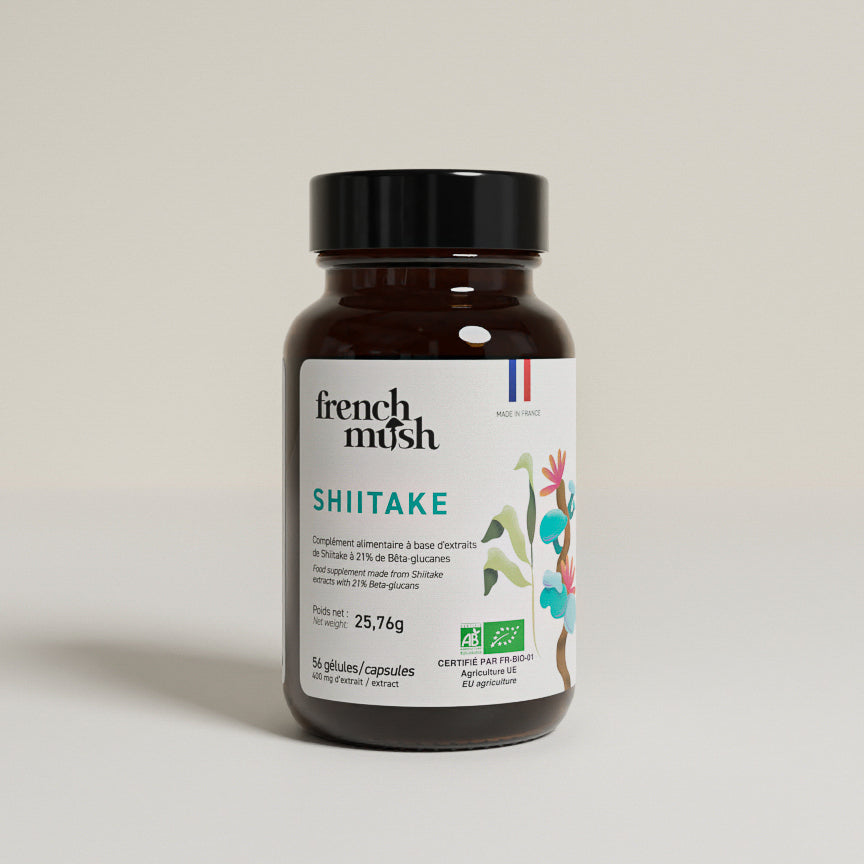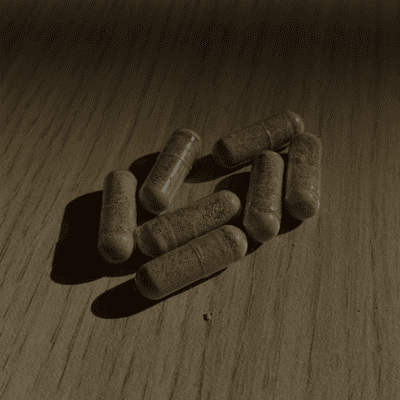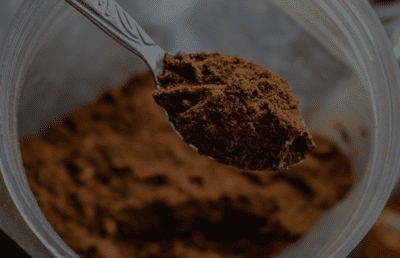In terms of natural medicine, medicinal mushrooms occupy an increasingly important place. Recognized for their numerous health benefits, they are attracting growing interest. However, their use raises very important questions, particularly regarding their potential interactions with conventional drug treatments.
At French Mush, we are committed to providing accurate, scientifically based information on the use of medicinal mushrooms. Our goal is to allow you to fully benefit from their properties while ensuring your safety, particularly if you are already undergoing medical treatment. Let's discover together this in-depth guide which explores the possible drug interactions between medicinal mushrooms and various treatments.
What is a drug interaction?
A drug interaction occurs when the simultaneous intake of two or more substances (drugs, food supplements, medicinal plants) modifies the therapeutic effect or side effect profile of one or more of them. These interactions can be either beneficial when they amplify the effect of a treatment or harmful when they reduce the effectiveness of a drug by increasing its toxicity.
Interactions can occur at different levels:
- At the level of absorption: certain compounds can modify the speed or quantity of drugs absorbed by the body.
- At the level of metabolism: medicinal mushrooms can influence the liver enzymes responsible for the degradation of drugs, which thus modifies their concentration in the blood.
- In terms of elimination: certain compounds can accelerate or slow down the elimination of drugs by the kidneys or liver.
- At the pharmacodynamic level: mushrooms can have similar or opposite effects to certain drugs, which thus modifies their action on the body.
It is therefore essential to consider these potential interactions when considering incorporating medicinal mushrooms into your diet, particularly if you are already taking medical treatment.
Why are drug interactions important?
Medicinal mushrooms, rich in antioxidants, polysaccharides and other bioactive compounds, can have powerful effects on our body. Although these effects are often beneficial, they can sometimes interfere with the action of certain medications. Understanding these interactions is essential to maximize their benefits and minimize potential risks.
It is therefore important to note that medicinal mushrooms can influence various aspects of our health, including:
- the immune system,
- blood circulation, and
- metabolism.
These effects, although generally positive, can sometimes conflict with certain medical treatments. This is why a careful and informed approach is necessary when considering incorporating these mushrooms into an existing health regimen.
The main medicinal mushrooms and their effects
1. Reishi (Ganoderma lucidum) : Known for its immunomodulatory and anti-inflammatory properties, Reishi is often used to strengthen the immune system and reduce stress. To consume it, reishi powder is a great option to consider since it can easily be incorporated into several meals.
2. Cordyceps: Known for boosting energy and supporting respiratory function, Cordyceps is particularly appreciated by athletes and people who wish to improve their endurance.
3. Chaga: Rich in antioxidants, it supports the immune system and is often used for its anti-aging properties and its ability to fight free radicals.
4. Lion's Mane : Associated with cognitive and nervous health , this mushroom is increasingly studied for its potential effects on memory and concentration. At French Mush, you will find for example lion's mane in capsules or lion's mane in powder .
5. Shiitake: Appreciated for its effects on cardiovascular health, Shiitake is also known for its immunostimulating properties and its potential to reduce cholesterol.
Each of these mushrooms has a unique profile of bioactive compounds, which explains their varied health effects. For example, Reishi contains triterpenes that give it its anti-inflammatory properties, while Lion's Mane is rich in compounds that stimulate the production of neuronal growth factors.
What are the most common drug interactions?

It is important to note that drug interactions created by mushrooms can vary from person to person and depend on many factors. These include the dose of mushroom consumed and the type of medication used.
Anticoagulants and antiplatelets
Mushrooms like Reishi can have natural anticoagulant effects. Caution is therefore advised if you are already taking blood-thinning medications such as warfarin or aspirin.
The combination of these two products could increase the risk of bleeding. It is therefore important to consult a healthcare professional before combining these mushrooms with anticoagulants, as adjustment of the medication dose may be necessary.
Immunosuppressive drugs
Medicinal mushrooms are often used to stimulate the immune system. This can be counterproductive if you are already taking immunosuppressants, for example after an organ transplant or to treat an autoimmune disease.
The stimulating effect of mushrooms on the immune system could potentially interfere with the action of immunosuppressants. As you will have understood, this would compromise the effectiveness of the treatment.
Antidiabetics
Certain mushrooms, such as Maitake, can influence glycemia. If you are diabetic and under treatment, increased monitoring of your blood sugar level is necessary. Medicinal mushrooms can potentially increase the hypoglycemic effect of antidiabetic medications. Ultimately, this may require medication dose adjustment under medical supervision.
Drugs metabolized by the liver
Many medicinal mushrooms can affect the liver enzymes responsible for the metabolism of certain drugs. This can potentially increase or decrease the effectiveness of these medications.
For example, certain mushrooms can inhibit or stimulate the activity of cytochrome P450 enzymes, a group of enzymes important in the metabolism of many drugs. This interaction may change the concentration of the medicine in the blood and thus affect its effectiveness or increase the risk of side effects.
It is also important to note that medicinal mushrooms can interact with other types of medications. For example, some mushrooms may have diuretic effects, which could amplify the action of prescribed diuretic medications. Likewise, mushrooms with sedative properties, such as Reishi, could increase the effects of anxiolytic or sleeping medications.
How to minimize risks?

Conclusion: caution is advised
Medicinal mushrooms have many health benefits. However, as with any food supplement, it is important to take an informed and cautious approach, especially if you are following medical treatment.
At French Mush, we are committed to providing you with the highest quality products, but we also emphasize the importance of responsible use. By combining scientific knowledge, expert advice, and carefully listening to your body, you can get the most out of medicinal mushrooms while maintaining your health.
Remember that each organism is unique. What works for one person may not work for another. Take the time to find out how your body responds to medicinal mushrooms and adjust your intake accordingly. With the right approach, these wonders of nature can become valuable allies in your quest for well-being and vitality. We would also like to emphasize thatmedicinal mushrooms should not be considered as a substitute for conventional medical treatments. They can be an excellent complement to a healthy lifestyle and proper medical care, but are not a substitute for the advice and treatment prescribed by your doctor.
Ultimately, the use of medicinal mushrooms should also be made taking into account:
- your diet,
- your level of physical activity,
- your stress management ability and
- your specific medical needs.
By taking this holistic perspective and remaining vigilant about potential interactions, you will be able to take full advantage of the benefits of these extraordinary mushrooms while maintaining your long-term health and well-being.
Sources :
Lion's Mane Drug Interactions You Should Know About for Safety
https://www.naturesrise.com/blogs/brainfood/lions-mane-drug-interactions
CORDYCEPS : Overview, Uses, Side Effects, Precautions, Interactions, Dosing and Reviews
https://www.webmd.com/vitamins/ai/ingredientmono-602/cordyceps
REISHI MUSHROOM: Overview, Uses, Side Effects, Precautions, Interactions, Dosing and Reviews
https://www.webmd.com/vitamins/ai/ingredientmono-905/reishi-mushroom
LION'S MANE MUSHROOM: Overview, Uses, Side Effects, Precautions, Interactions, Dosing and Reviews
https://www.webmd.com/vitamins/ai/ingredientmono-1536/lions-mane-mushroom
